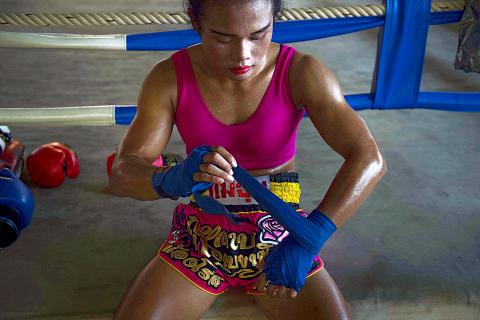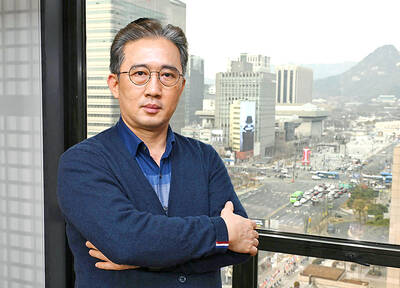Wearing red lipstick and a pink sports bra, Nong Rose trades blows with her twin brother in a Thai boxing gym, preparing for a foreign debut that will make her the first transgender fighter to enter the ring in France.
A few weeks ahead of the Muay Thai match in Paris, the 21-year-old is training hard in central Thailand’s Chachoengsao Province, with her brother as sparring partner.
Boxing is part of the siblings’ DNA — they learned how to jab, cross and kick from their uncle, a professional Muay Thai fighter, who started teaching them the basics when they were eight.

Photo: AFP
“Since [we were] little ones, we used to fight... but she was always stronger than me,” said Nong Rose’s brother, Somrak Polchareon.
In the eyes of the Thai government, Nong Rose is a man named Somros Polchareon, but she has always felt like a girl and started dressing like one at the age of 14.
In life as in the ring, where she competes against men, finding her place has not always been easy.
“When I started fighting [as a girl], I was afraid that people would not accept me,” she said, wiping away sweat after a feisty round of training.
While Thailand has a reputation as a free-spirited haven for queer people, discrimination abounds outside of nightlife and entertainment venues.
The boxer said her male opponents were initially rattled — or even angered — by her appearance.
“In my village everyone knew me so it was easy, but outside the city, some boxers looked at me wrong and said that trans people could not win,” she said.
Many transgender Thais say they are treated like second-class citizens in a nation where changing genders was considered a mental illness by the military as recently as 2012.
The practice is still not legally recognized, causing headaches for those trying to navigate medical care or bureaucratic processes.
Nong Rose, who turned professional after graduating from high school two years ago, pushed through the prejudice by racking up victories in the ring, winning half of her 300 matches.
Today, she is better known for her knees of steel.
“In combat, she always walks on you and hammers you with her knees,” said Chalongchai Meemindee, a 25-year-old boxer known as “Phetsuphan” who faced Rose in November.
“It’s good to have her in the ring, because it brings color and attracts viewers, especially foreigners,” he added.
Nong Rose is not the first transgender boxer in Thailand.
Nong Toom, whose story is captured in the 2004 film Beautiful Boxer, led the way, famously using her championship winnings to pay for a sex change.
“She was my role model,” Nong Rose said, adding that the fighter comes to support her at most matches.
For the up-and-coming boxer, the Paris competition on Saturday against formidable French Muay Thai champion Akram Hamidi is a chance to advance her career — and bring more attention to transgender fighters.
“It helps to promote the trans, to show that we are worth as much as the others. We are not weak,” she said.
Nong Rose says she plans to take her transition to the next step after her boxing days are over.
“Today, I do not take hormones, because it affects my condition and my boxing. When you are on hormones, you have much less energy, but as soon as I stop boxing, I do all the operations to finish my transformation,” she said.

VAGUE: The criteria of the amnesty remain unclear, but it would cover political violence from 1999 to today, and those convicted of murder or drug trafficking would not qualify Venezuelan Acting President Delcy Rodriguez on Friday announced an amnesty bill that could lead to the release of hundreds of prisoners, including opposition leaders, journalists and human rights activists detained for political reasons. The measure had long been sought by the US-backed opposition. It is the latest concession Rodriguez has made since taking the reins of the country on Jan. 3 after the brazen seizure of then-Venezuelan president Nicolas Maduro. Rodriguez told a gathering of justices, magistrates, ministers, military brass and other government leaders that the ruling party-controlled Venezuelan National Assembly would take up the bill with urgency. Rodriguez also announced the shutdown

Chinese President Xi Jinping’s (習近平) purge of his most senior general is driven by his effort to both secure “total control” of his military and root out corruption, US Ambassador to China David Perdue said told Bloomberg Television yesterday. The probe into Zhang Youxia (張又俠), Xi’s second-in-command, announced over the weekend, is a “major development,” Perdue said, citing the family connections the vice chair of China’s apex military commission has with Xi. Chinese authorities said Zhang was being investigated for suspected serious discipline and law violations, without disclosing further details. “I take him at his word that there’s a corruption effort under

China executed 11 people linked to Myanmar criminal gangs, including “key members” of telecom scam operations, state media reported yesterday, as Beijing toughens its response to the sprawling, transnational industry. Fraud compounds where scammers lure Internet users into fake romantic relationships and cryptocurrency investments have flourished across Southeast Asia, including in Myanmar. Initially largely targeting Chinese speakers, the criminal groups behind the compounds have expanded operations into multiple languages to steal from victims around the world. Those conducting the scams are sometimes willing con artists, and other times trafficked foreign nationals forced to work. In the past few years, Beijing has stepped up cooperation

The dramatic US operation that deposed Venezuelan president Nicolas Maduro this month might have left North Korean leader Kim Jong-un feeling he was also vulnerable to “decapitation,” a former Pyongyang envoy to Havana said. Lee Il-kyu — who served as Pyongyang’s political counselor in Cuba from 2019 until 2023 — said that Washington’s lightning extraction in Caracas was a worst-case scenario for his former boss. “Kim must have felt that a so-called decapitation operation is actually possible,” said Lee, who now works for a state-backed think tank in Seoul. North Korea’s leadership has long accused Washington of seeking to remove it from power